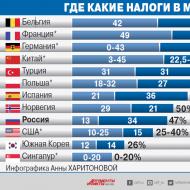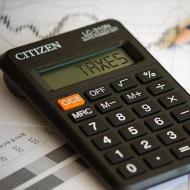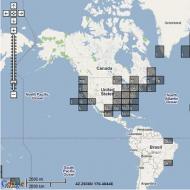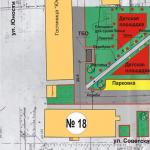
How many taxes does a Russian pay. How much taxes do we actually pay? So, what taxes do Russians pay?
We constantly hear and read about our “lowest” income tax rate (PIT) in the media. True, they "forget" to tell us that 13% are just the tip of the iceberg. Insurance premiums and personal income tax are deducted from our official salary. Only the first deduction to the budget is paid by the employer, and the second - by the employee. As a result, we get our hands on a salary, which theoretically could be 47% (34% + 13%) more. In addition, when shopping, we pay value added tax (VAT - 18%), excise taxes, import duties - everything that businessmen put into the price of goods, shifting their burden to end consumers.
"Without taking into account the insurance premium, a person who smokes a lot, drinks and consumes a lot of gasoline, clearly pays the state more than 60%," says Dmitry Tikhonov, Associate Professor, Graduate School of Finance and Management, RANEPA.
And taking into account the contribution - even more than 90%. If we add here taxes on property, transport and land, as well as "communal services" ... After all, the cost of housing and communal services, and this is also a kind of tax on water, gas, heat, on average in the country annually increases by 20-25% ...
The rich don't pay or cry
Of course, in comparison with the developed countries of the West, taxes in Russia are still lower (see infographic). But, firstly, salaries in European countries are several times higher than in the Russian Federation. Secondly, for this money, residents of European countries have at their disposal modern healthcare and a much more developed infrastructure. Third, in developed countries people usually pay their own taxes. At least income tax. That is, they receive a full salary and see what they are doing at work.

And fourthly, and this is perhaps the most important, in many countries of the world, especially in those where tax rates are high, there is a progressive scale. That is, a poor person will not be taken away half of his already small salary. And the rich will pay much more.
“The system of taxation of income in our country is beneficial to the rich,” explains Dmitry Tikhonov. - It's not so much about how much you earn, but how much is left to invest or save. It turns out that after all the deductions, the poor have nothing left, and the rich have huge resources. Rich and very rich people sit in the Duma and the Federation Council. They hinder all the bills on progressive taxation ”.
However, in our country high and unfair taxes are compensated by the "non-obligation" to pay them. According to law enforcement agencies, the share of gray (partly official) and black salaries (completely without paying income tax and social contributions) in our country today is about 50%. “About half of the population does not pay all taxes that are required,” comments D. Tikhonov. - But these people only agreed with the employer's decision. Possibly in case of direct taxation (when a person pays the tax himself. - Ed.) they would not break the law. "
When will personal income tax increase?
 “It is the indirect taxes (hidden in the price of goods. - Ed.)
are best collected, so the whole world goes to them, - believes renowned economist Vladimir Mau... - High taxes are a necessity, our social obligations are quite expensive. In Singapore and South Korea, where tax rates are low, there is no state pension system, only a corporate one. And medicine there is mostly paid. "
“It is the indirect taxes (hidden in the price of goods. - Ed.)
are best collected, so the whole world goes to them, - believes renowned economist Vladimir Mau... - High taxes are a necessity, our social obligations are quite expensive. In Singapore and South Korea, where tax rates are low, there is no state pension system, only a corporate one. And medicine there is mostly paid. "
However, our state is still only partially social, experts admit. More precisely, it all depends on the region. “In Moscow, the welfare state has turned out completely, but, for example, in St. Petersburg - already in part,” explains D. Tikhonov. “In a good time, about 30 regions have a profitable budget, and in a crisis - only about 15. And in unprofitable regions, the welfare state is practically absent”.
A revision of social obligations is inevitable, independent experts are sure. “The budget in parameters similar to 2015 will remain in the first half of 2016 at the expense of the Reserve Fund and the National Welfare Fund,” believes Nikita Isaev, Director of the Institute of Contemporary Economics... “In the second half of the year, there will not be enough money for this, so it will be necessary to cut costs by raising the retirement age, refusing to compensate pensions for inflation and a number of social guarantees.”
"It was built on taxpayers' money!" Such phrases are often used in political disputes when it comes to the responsibility of the state to its citizens. Only - not in Russia. Our tax collection system is built in such a way that ordinary citizens hardly think about what taxes they pay and what they go to. There are, of course, exceptions such as taxes on real estate and motor vehicles - they really have to be formalized on their own, but these payments are not (yet) large enough to play a role in political life.
To assess the burden of taxes in Russia, we decided, firstly, to figure out how much the state really depends on our payments with you. And, secondly, imagine what would have happened if we had not paid taxes (receiving mediocre medical care and a meager pension in return), but would have disposed of this money at our own discretion.
So what taxes do Russians pay?
Individuals pay taxes on a car, apartment, house, land and the like. Working citizens also pay personal income tax (PIT).
Indirectly, the population bears the value added tax on goods and services, the employer's insurance contributions to off-budget funds, and excise taxes on alcohol and tobacco.
How much taxes does an employee pay?
Directly - only personal income tax (13% of the salary). However, the employee usually does not feel this - the tax is deducted from the salary and transferred to the state by the employer. When a person is asked about his salary, he usually mentions the "net" amount - what goes into his bank account or is issued at the cash desk. In fact, his salary is the entire amount, including tax. In the example below, the employee would say that his monthly salary is 87,000 rubles. In fact - 100,000 rubles.
The employer also pays insurance contributions for the employee to the Pension Fund of the Russian Federation (22% of salary before tax), the Federal Compulsory Medical Insurance Fund (5.1%) and the Social Insurance Fund (2.9%). If an employee earns more than a certain amount per year, then insurance premiums in the Pension Fund of the Russian Federation are reduced to 10%, and in the Social Insurance Fund they are zeroed.
What would be the income if you did not pay taxes?
An employee with a monthly pre-tax salary of 100 thousand rubles costs his employer almost 1.5 million rubles a year: 1 million rubles of which goes to the employee, and almost 0.5 million rubles goes to the state. The person from the above example receives 87 thousand rubles a month. If we imagine that there is no state medicine and pensions, and also if there was no income tax, then the employee from our example would receive 125 thousand rubles a month and theoretically could spend 25 thousand rubles. on your health and / or put off for old age.
The dream of a tax-free world also has its limits. If social contributions are canceled overnight, most people are unlikely to save for the future - rather, they would prefer to spend money here and now. This will lead to a jump in demand for goods and services throughout the country - and, consequently, will inflate the prices for them. That is, the growth in real well-being may turn out to be insignificant.
How much do we work for the government?
You can look at taxes and contributions from a different angle - as additional time spent at work to pay them. For salaries less than 60 thousand rubles ("on hand"), to which "discounts" on the payment of social contributions are not applied, this is 33% of the working time. That is, every working day out of 8 hours spent at a factory, in an office or at a counter, a conventional Russian works for one hour and 21 minutes for the Pension Fund, 48 minutes for regional and local authorities, and another half hour for compulsory medical insurance and social insurance funds. During the year, about 80 working days accumulate, which are spent on paying taxes and contributions.
For people with high salaries, the share of income given to the state will be lower, but it will still remain significant: the ratio of compulsory payments to the employer's total expenses decreases from 33% to 25% only for salaries of 600 thousand rubles per month and above.
Where do direct and indirect taxes on individuals go?
VAT proceeds go to the budget of the Russian Federation. 85% of personal income tax goes to the budget of the constituent entity of the federation, the rest goes to local budgets. The regions also get the transport tax. Excise taxes are divided between the federal and regional budgets: in particular, the center gets the excise taxes on tobacco, and the regions get most of the excise taxes on alcohol. Land tax and property tax of individuals are transferred to municipalities.
Insurance contributions for pensions, medicine and social insurance go to the respective funds. From this money, the PFR pays pensions to pensioners, the FFOMS pays for medical services to those who apply to public hospitals and clinics, and the FSS pays benefits for temporary disability, pregnancy, childbirth and childcare. Considering that the Pension Fund is being executed with a large deficit, which has to be compensated from the federal budget, it can be said that not only the contributions of working Russians, but also other federal taxes are used to pay pensions.
How much does the budget depend on taxes?
Very much. In 2015, taxes, together with insurance premiums, accounted for 79% of revenues and 71% of expenditures of budgets of all levels, as well as extra-budgetary funds. The contribution of personal income tax, however, is more modest - about 10% of total income for the past year. This will not be enough for education, health care, or defense - except for the maintenance of security and the work of law enforcement agencies.
This comparison, however, is rather arbitrary, since personal income tax goes to the budgets of the subjects, and not to the federal budget. That is, 13% of the salary goes not so much to tanks and missiles (although indirectly to them too), as to things like schools and roads.
Georgy NEYASKIN
You can see the infographic and table for the article.
Until I became an entrepreneur, I really believed that Russia has some of the lowest taxes in the world. No wonder - on TV it was often mentioned that the so-called personal income tax (personal income tax ) is only 13%, and this is one of the lowest rates in the world.
I really believed that we all pay 13% tax to the national budget.
But when I became an entrepreneur and had to dive into the world of accounting and finance a little, I was shocked!
What's the catch?
And the catch is that most of us know (or remember) only one tax - personal income tax, 13%. And no one ever remembers about various hidden taxes and excise taxes.
I really believed that medicine in Russia is completely free - the compulsory medical insurance policy was always given to me free of charge. Doctors, prescribing an expensive analysis, grinning said that they say "be proud, they do everything for free".
But it turned out that every month we donate a significant part of the money to the compulsory medical insurance. Have you ever thought about it? Well, let's take a look at all this in more detail.
How many taxes are "pinched off" from the salary
Let's take a look at the most obvious taxes first.
13% - personal income tax. This tax is deducted from you against the state from the entire amount earned. Here everything is generally clear, we will not stop for a long time.
22% - contributions to the pension fund ... Here the amounts have already gone more serious. a fifth of your entire salary will automatically go to your pension fund. You may be in doubt and say - "well, this is in my retirement account."
Now think about it - the average life expectancy of a man in Russia is 67 years. At the same time, the statistics are well "supported" by the Caucasian regions, in which there are indeed many long-livers. The retirement age for men is now 65. Do you really think you will get your money back?
And also look at the size of pensions in Russia. It has been calculated that if you set aside 22% of your salary just for depositing in a bank, so much money would have been collected there in your entire life so that your pension would be at least 40 thousand per month. Here is such arithmetic.
5.1% - contribution to the compulsory health insurance fund. Yes, yes, I spoke about this tax at the beginning of the article. Free medicine? Ha ha! You pay for a "free" policy every month, your entire life.
3.1% - contribution to the social insurance fund. This is the same fund that pays us "sick leave" and "maternity". You thought you were paid by your employer or the government? Don't be ridiculous - every month you pay money for the opportunity to get 40-60% of the salary on sick leave.
TOTAL salary: 43.2% tax , you give only visible taxes from your salary.
But, unfortunately, this is just the beginning ..
Hidden taxes on products and goods
You've probably heard about the fact that the value added tax (VAT) has been raised to 20% since 2019. What does it mean?
Our state takes taxes not only from all our income, but also from expenses.
Each product or service is subject to VAT.And this is also 20% of your money. It turns out that when you buy groceries in a store, you again give a fifth of their price in the form of tax.
Further. Various excise taxes and licenses. If you periodically buy alcohol, tobacco products, some other "regulated" goods, you also pay a certain percentage of the price in addition to tax.
Other "hidden" taxes
Another point - wherever we give our money, we in particular give it in the form of taxes. Where for example?
CTP policy for motorists? A quarter of the price of the policy is hidden taxes.
Utility bills - all management companies make taxes in advance in the price of services. What about the overhaul fee? Everyone pays, it’s not clear to which fund, and to which of you has the house been renovated in the last ten years?
And what about transport tax, property tax? All this we pay in good faith.
How much is gasoline tax?
You would know how many taxes and excise taxes are actually in the price of a liter of gasoline! Let me tell you.
So, if 1 liter of gasoline costs, for example, 43 rubles, here's how many taxes are in its cost:
- 22% (9.5 rubles) - excise.
- 20% (8.6 rubles) - VAT, increased from January 1, 2019.
- 19% (8 rubles) - MET - mineral extraction tax, increased from January 1, 2019.
- 5% (2.2 rubles) - other taxes. There are also a few small taxes on the price of gasoline.
Total: 66% of the price of gasoline is taxes. That is, if our state still adhered to the words "oil is the national property", then even taking into account the earnings of gas stations, oil refineries, oil companies, etc., the cost of a liter of gasoline would be 15 rubles.
Let's sum up - how much taxes do Russians pay in total?
- 43.2% - we are immediately deducted from our salary;
- 17% - VAT ( the fact is that the VAT on some goods or services is just below 20%. Therefore, I took the average value );
- 8%(about) - hidden taxes, excise taxes, gasoline taxes, etc.
- 5%(about ) - other taxes (real estate tax, housing and communal services, paid government services, etc.).
Total: 73.2% - real tax in Russia!
One way or another, the state receives from us about 73% of all our income.
Do you still think that taxes are low in Russia?
Like, subscribe to the channel. Earlier I put target for 2019 - to achieve earnings of 150 thousand rubles a month. Join us to my channel, follow my successes and failures!
An ordinary citizen, i.e. an individual transfers less money to the state than someone who is engaged in business (a legal entity or an individual entrepreneur), but still he cannot avoid paying taxes.
Related materials:
Types of tax deductions
A citizen contributes to the capital's budget *:
- Transport tax - subject to vehicle ownership;
- Land tax - subject to ownership of a land plot;
- Individual property tax - subject to property ownership;
- Personal income tax - subject to income, is subject to rates of 9%, 13%, 30% or 35%;
And also, a citizen himself, or indirectly through an employer, pays insurance contributions to extra-budgetary funds: the Pension Fund of the Russian Federation (PFR), the Social Insurance Fund (FSS) and the Federal Fund of Compulsory Medical Insurance (FFOMS).
Transport tax
It must be paid no later than December 1 of the year following the expired tax period. Those. transport tax for 2012 must be paid by December 1, 2013
An object taxation | Tax rate (rub.) |
Cars cars with engine power (with each horsepower): | |
over 100 hp up to 125 hp (over 73.55 kW to 91.94 kW) inclusive | |
over 125 hp up to 150 hp (over 91.94 kW to 110.33 kW) inclusive | |
over 150 hp up to 175 hp (over 110.33 kW to 128.7 kW) inclusive | |
over 175 hp up to 200 hp (over 128.7 kW to 147.1 kW) inclusive | |
over 200 hp up to 225 hp (over 147.1 kW to 165.5 kW) inclusive | |
over 225 hp up to 250 hp (over 165.5 kW to 183.9 kW) inclusive | |
Motorcycles and scooters with engine power (with each horsepower): | |
up to 20 hp (up to 14.7 kW) inclusive | |
up to 110 hp (up to 80.9 kW) inclusive | |
over 110 hp up to 200 hp (over 80.9 kW to 147.1 kW) inclusive | |
over 200 hp (over 147.1 kW) | |
Trucks with engine power (with each horsepower): | |
up to 100 hp (up to 73.55 kW) inclusive | |
over 100 hp up to 150 hp (over 73.55 kW to 110.33 kW) inclusive | |
over 150 hp up to 200 hp (over 110.33 kW to 147.1 kW) inclusive | |
over 200 hp up to 250 hp (over 147.1 kW to 183.9 kW) inclusive | |
over 250 hp (over 183.9 kW) | |
Other self-propelled vehicles (with each horsepower): | |
Snowmobiles, snowmobiles with engine power up to 50 hp (up to 36.77 kW) inclusive | |
Snowmobiles, snowmobiles with engine power over 50 hp. (over 36.77 kW) | |
Boats, motor boats and other water vehicles with engine power up to 100 hp. (up to 73.55 kW) inclusive | |
Boats, motor boats and other watercraft with engine power exceeding 100 hp. (over 73.55 kW) | |
Yachts and other sailing and motorized vessels with engine power up to 100 hp. (up to 73.55 kW) inclusive | |
Yachts and other sailing and motorized vessels with engine power over 100 hp. (over 73.55 kW) | |
Jet skis with engine power up to 100 hp (up to 73.55 kW) inclusive | |
Jet skis with engine power over 100 HP (over 73.55 kW) | |
Aircraft with non-jet engines (with each horsepower) | |
Other water and air vehicles without engines (from a vehicle unit) |
Land tax
An object taxation | Tax rate (rub.) |
Lands that are part of the zones of agricultural use and production in Moscow; Land plots provided for personal subsidiary and dacha farming, gardening, truck farming or animal husbandry; Land plots provided and used for the operation of sports facilities (although the latter in the possession of individuals are extremely rare). | 0.3% of the cadastral value of the site |
Personal parking space (i.e. a parking lot for long-term storage of individual vehicles) | 0.1% of the cadastral value of the site |
Individual property tax (residential and non-residential premises)
In accordance with article 217 of the Tax Code of the Russian Federation and with law N 78-FZ, the 13% tax on personal income is not levied on inherited income regardless of the degree of kinship or next of kin. This applies to any income, with the exception of remuneration paid to the heirs of "authors of works of science, literature, art, as well as discoveries, inventions and industrial designs" (Article 217, Clause 18 of the Tax Code of the Russian Federation).
Personal income tax (personal income tax)
The tax rate is 9%, 13%, 30% or 35% of the total amount of income received for the billing period (i.e. for the year).
The penalty for an unsubmitted declaration is 5% of the unpaid tax amount for each month of delay, but not less than 1,000 and no more than 30% of the unpaid tax amount.
9%
- income in the form of interest on mortgage-backed bonds issued before January 1, 2007;
- the income of the founders of the trust management of the mortgage coverage received on the basis of the acquisition of mortgage participation certificates issued by the manager of the mortgage coverage prior to January 1, 2007.
30% those who are tax residents of the Russian Federation are obliged to pay (we are talking about those citizens who are in the territory of the Russian Federation for less than 183 calendar days a year). However, this category will have to pay the standard 13% for labor activity and labor activity as a highly qualified specialist, and for income from equity participation in the activities of Russian organizations - 15%.
35% must be paid if received:
- winnings or prizes received in a competition, lottery, TV game, etc .; an exception - prizes and winnings are less than 4,000 rubles (for details, see the article "");
- interest on bank deposits that exceed the size: for ruble deposits this is the refinancing rate + 5%, for foreign currency deposits - 9% per annum (Article 214.2 of the Tax Code of the Russian Federation);
- the amount of savings, if the interest on the loan you took is lower than that specified in article 212.2 of the Tax Code of the Russian Federation: for a ruble loan, this is 2/3 of the refinancing rate over the amount of interest calculated on the basis of the terms of the agreement, for foreign currency loans - 9% per annum;
- payments for the use of funds of members of a credit consumer cooperative, as well as interest for the use by an agricultural credit consumer cooperative of loans from members or associate members of this cooperative, in terms of the excess of the amount of the specified fee, interest charged over the amount of payment, interest calculated based on the refinancing rate + 5%. Payments to off-budget funds
Self-pay applies to those individuals who do not have the status of individual entrepreneurs, but pay salaries to employees (housekeepers, builders or repair crews for) and / or pay remuneration to contractors who are individuals.
During 2012-2013, the maximum rate of insurance premiums was reduced from 34 to 30 percent. It will apply to payments accrued to the employee that do not exceed RUB 512 thousand in 2012 and RUB 573 thousand in 2013.
Keep in mind that an individual receiving remuneration cannot independently pay contributions to the Pension Fund or the Social Insurance Fund, if he is not an individual entrepreneur.
* The rates for taxation objects are indicated according to the information of the Moscow Department of the Federal Tax Service.
Individual entrepreneurs and organizations that are employers are obliged to withhold from all incomes paid to their employees (including those working under a civil law contract) Personal income tax and also list insurance premiums in the Federal Tax Service and the FSS.
Note: a tax consultant will help you with controversial issues, there is a free consultation.
Personal income tax (personal income tax)
Personal income tax- this is the main type of direct taxes (when the state levies tax directly on the income or property of the taxpayer). An employer who pays income to his employee is recognized as a tax agent in such a situation.
Tax agent Is a kind of intermediary between the state and the taxpayer, who is responsible for calculating, withholding and further transferring taxes (in this case, personal income tax from the employee's income) to the state budget.
The employer must withhold income tax from the amount accrued to the employee and transfer it to the tax office at the end of each month on the day the salary is paid. When calculating personal income tax, it is necessary to take into account all payments made to an employee during the month.
Personal income tax is calculated according to the following formula:
Personal income tax = (Employee's monthly income - Tax deductions) x Tax rate
Tax rate for the calculation of income tax is 13% (for virtually all income paid to employees) or 30% (in the case of payments to foreign workers).
Note: Since 2015, the tax rate of 13% applies to dividend payments.
When calculating income tax, the amount of the tax base can be reduced by the amount of tax deductions, which can be applied only for income taxed at a rate of 13% (excluding dividends).
You can read more about personal income tax for employees on this page.
Note! From 2020, the payment of personal income tax can be made at the expense of a tax agent, not a taxpayer. This is permissible if, according to the results of the tax audit, it turned out that the employer did not withhold personal income tax or did not withhold it in full (clause 9 of article 226 of the Tax Code of the Russian Federation).
Thus, if the employer pays the employee a gray salary, and this becomes clear during the audit, then the company or individual entrepreneur will pay the additional personal income tax from its own pocket. It will not be possible to withhold this amount from the employee, since in accordance with the new edition of article 208 of the Tax Code of the Russian Federation, it not considered employee's income.
Read about how to find out about tax debts.
Insurance premiums for employees
Every employer is obliged to pay monthly insurance premiums for its employees. They are calculated from the amount of income paid to an individual and transferred from the employer's own funds. Starting in 2017, contributions must be paid to the Federal Tax Service (FTS) and the Social Insurance Fund (FSS).
Insurance premiums are paid in accordance with the general rates set by the Russian Government for each year. In 2020, the following rates apply:
- For compulsory pension insurance - 22% .
- For compulsory medical insurance - 5,1% .
- FSS - 2,9% (excluding contributions from accidents).
Some categories of employers are entitled to apply preferential rates when paying insurance premiums. They can be found in this table.
In 2020, the maximum limits for assessing contributions have changed:
- On the OPS - 1 292 000 rub. (in case of excess, contributions are paid at a reduced rate - 10% ).
- For compulsory medical insurance (medical insurance) - the limit value has been canceled.
- On the OSS - 912 000 rub. (in case of excess, contributions are no longer paid).
Insurance premiums for pension, medical and social insurance are calculated on an accrual basis from the beginning of the calendar year. You need to pay them monthly no later than the 15th next month.
You can read more about insurance premiums for employees at
















